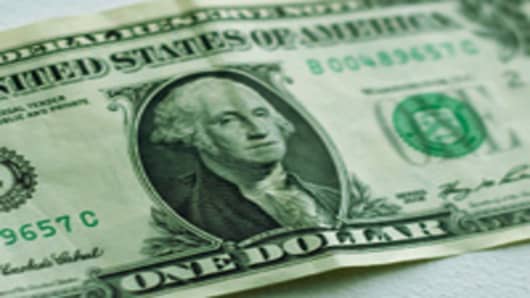With the U.S. economy narrowly avoiding recession and inflation concerns rising, the dollar should advance further next week, though any sign of new job losses will dull its appeal and derail a sustained recovery.
The greenback rode a wave of firm economic data and a spike in government bond yields to end the week up 1.4 percent versus a basket of six major currencies.
With food and energy prices still at lofty levels and a report showing the economy grew at an upgraded 0.9 percent rate in the first quarter, analysts said the Federal Reserve was not likely to cut interest rates again this year.
U.S. interest rates futures are even pricing in a 25-basis-point rate hike by year end.
"You haven't had the collapse in the U.S. economy that the doomsayers were predicting," said Joseph Trevisani, market analyst at FX Solutions in Saddle River, New Jersey.
"The scenario of an improving economy and a Fed that's ahead of the curve hasn't changed." That has shored up dollar support, with a firmer greenback contributing to oil's retreat from record highs around $135 and further brightening the U.S. economic outlook.
But, as Morgan Stanley strategists write in a recent note, "uncertainty reigns....and the economy still faces significant headwinds" that could wipe out recent dollar gains.
The main threat next week is Friday's U.S. nonfarm payrolls report, expected to show the economy shed 50,000 jobs in May.
That would be the fifth straight month of job losses, and Trevisani said a bigger decline would hit the dollar hard, sending it back toward an all-time low around $1.60 per euro.
But even then, he said the euro should remain in a broad $1.53-$1.60 range.
"I don't think there is anyone who has confidence he's going to make money buying the euro north of $1.60," he said.
Alternatively, he said it will take a much bigger positive surprise to forthcoming U.S. data to push the euro much below $1.5250, and analysts said that is not likely to come from the manufacturing and services sector data due this week.
The euro will likely retain support from the European Central Bank, expected to leave interest rates on hold at 4 percent on Thursday and to continue stressing the risks associated with high consumer price inflation.
That means the dollar's best performance is likely to come against currencies from softening economies where central banks are biased toward interest rate cuts.
Morgan Stanley says sterling is at the top of that list and suggests going short the British pound against the dollar.
The Bank of England also meets next week, though economists polled by Reuters expect it to hold rates at 5 percent for now.
Strategists at Brown Brothers Harriman also recommend buying the dollar against the yen around current levels, targeting a move to 108.20, a level last seen in February.
"The U.S. dollar's technical tone is improving, and with sentiment shifting back in favor of the dollar, more short dollar positions are likely to be unwound," the bank's strategists wrote in a note to clients.


